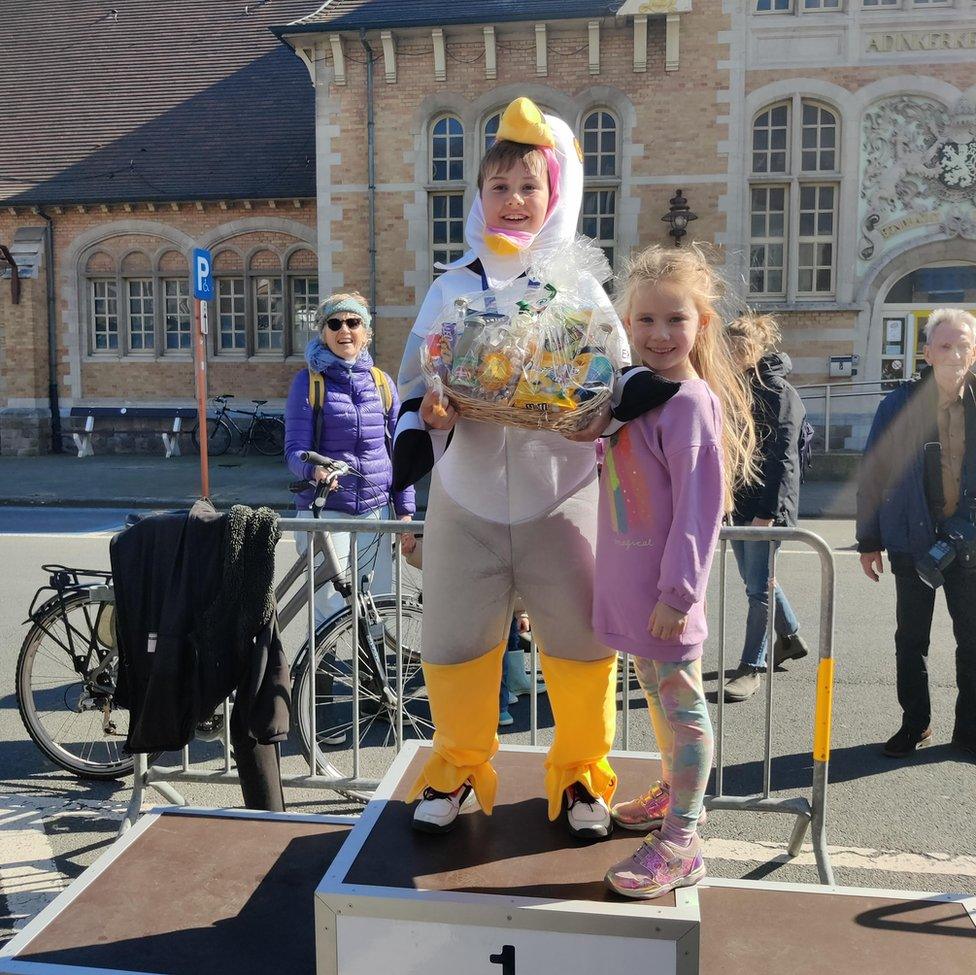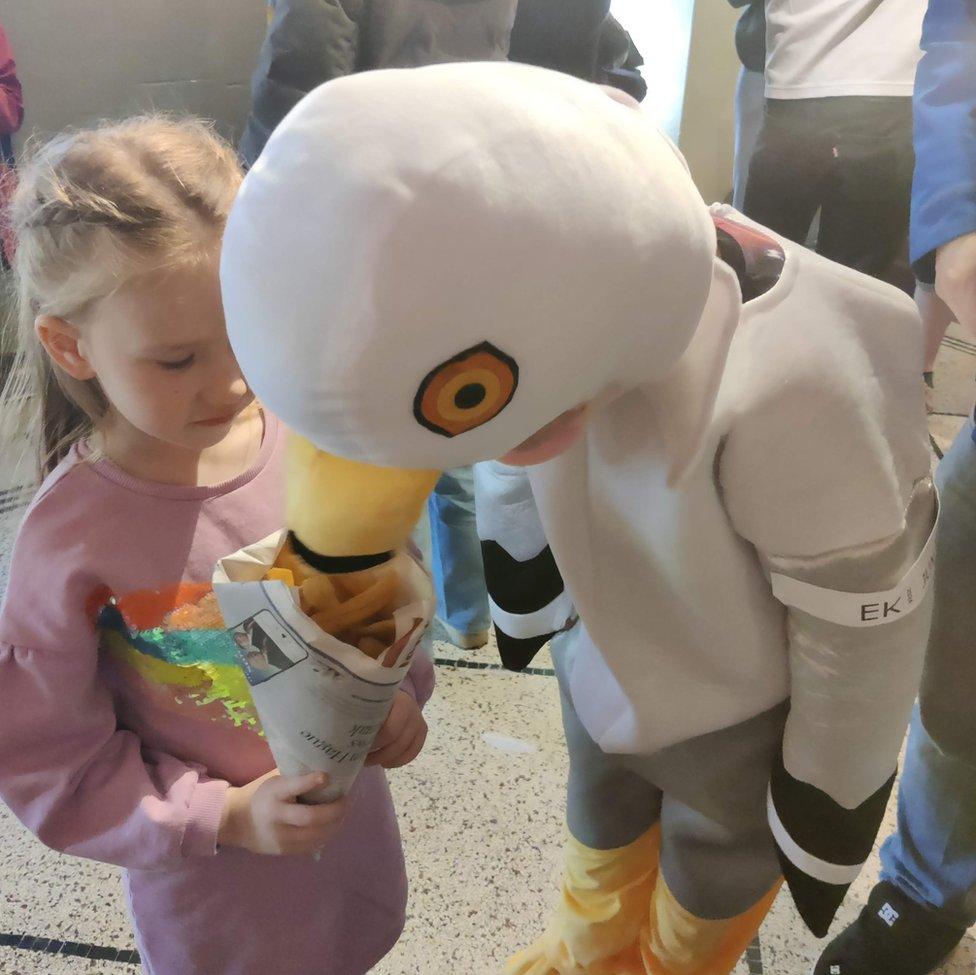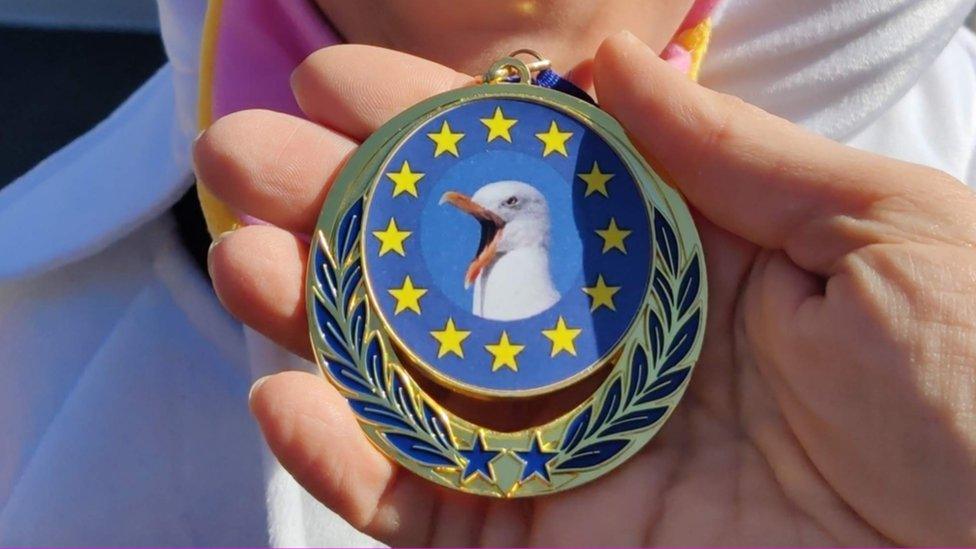'Seagull Boy', nine, wins European screeching competition
- Published
Cooper scored 92 points out of a possible 100
A nine-year-old British boy has won a European championship with his uncanny impression of a seagull.
Cooper, from Chesterfield in Derbyshire, travelled to the Belgian coastal town of De Panne to compete in the EC Gull Screeching competition.
He originally started doing seagull impressions after being nipped by one while he was eating a tuna sandwich.
He wanted to become "Seagull Boy", like when Peter Parker became Spider-Man after being bitten by a spider.
"I feel like they are a really nice animal, I like them because of their noise," said Cooper.
"Sometimes they can be a bit scary and I'm still a bit wary of eating at the beach, so that's why I eat in a small tent.
"The last meal I had at the beach was an ice cream."

The EC Gull Screeching competition is held every year in an attempt to change the image of seagulls, which some people see as a nuisance
Cooper's mum, Lauren, said it was initially annoying when he started doing seagull impressions, but then they realised he was really good at it.
"People would start to turn around and look for the seagull," she said.
The family heard about the competition from a random man who overheard Cooper doing impressions at a soft-play centre and suggested Cooper could compete.
He scored 92 points out of a possible 100, which meant he won the juvenile category and also had the highest points score in the competition.
The other categories were for adults and also for "colonies", meaning a group of people doing seagull impressions.
Cooper took his lucky mascot with him - a small model seagull which he calls Stephen and spells with a "ph", but his parents call Steven Seagull, like the actor Steven Seagal.
His parents and grandparents were there to support him, as was his sister Shelby, who had a big cone of chips made from foam.

Cooper's sister Shelby was there to support him with a cone of foam chips
Jan Seys, a marine biologist and one of the judges, said: "He managed to include several call types in his performance and each of them resembled a real seagull call in a most impressive way.
"In fact, for me, he was not only the best of the young participants, but of all those who took part in the championship."
Each judge awarded up to 20 possible points, with up to five points awarded for how the competitors were dressed and the behaviour they exhibited.
The remaining 15 points were awarded for how they mimicked the call of a seagull.
"We pay attention to timbre, rhythm, as well as variation," said Mr Seys.
"After all, seagulls have a fairly extensive repertoire of sounds, ranging from alarm calls to long calls that make it clear that they do not want any unwanted intruders in their territory."

Cooper was awarded a medal for winning the juvenile category
Mr Seys said there was a serious motive behind the competition.
"It is more than fun and entertainment, it is also meant to elicit some sympathy for seagulls, which are an essential element of our coasts but are often maligned as 'rats of the sea'," he said.
"Also, we conceive of the judging as serious business, with a jury composed of professionals experienced in gull research and/or policy."
Mr Seys said little was known about the language seagulls use.
"A few sounds are known and typical of certain behaviour, but how interesting would it not be to fully understand their language?" he said.
"To understand what they say to each other - because they do this all the time - and who knows, maybe even to other animals.
"To understand how they explain to each other that somewhere a farmer has started ploughing, or at sea a fisherman has just pulled up his nets."

Follow BBC Derby on Facebook, external, on X, external, or on Instagram, external. Send your story ideas to eastmidsnews@bbc.co.uk, external or via WhatsApp, external on 0808 100 2210.